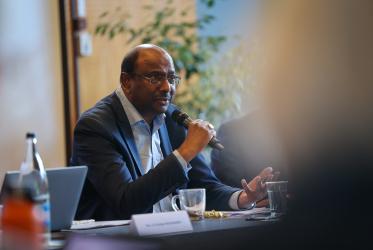Those gathered noted that, as the WCC is entering a new phase of leadership, the global fellowship expresses gratitude for the message of Pope Francis to the WCC 11th Assembly, particularly the vision that a common mission as followers of Christ is to bring reconciliation to the world and to inspire churches to continue their journey together in a Pilgrimage of Justice, Reconciliation, and Unity.
The WCC delegation and Pope Francis noted that their ongoing work builds on former leaders and member churches that have helped the global fellowship’s strategic plan for the next eight years focus on unity, vision, justice, peace, and making the world a better place for all humans and all creation.
The meeting noted the ever-stronger bonds between the WCC and the Roman Catholic Church as they continue to develop increasing levels of collaboration in shared work and shared commitment to the one ecumenical movement. This year marks the 58th year of collaboration through the Joint Working Group between the WCC and Roman Catholic Church.
The WCC delegation was comprised of Bishop Dr Heinrich Bedford-Strohm, WCC central committee moderator; Rev. Prof. Dr Jerry Pillay, WCC general secretary; and Prof. Dr Vasile-Octavian Mihoc, WCC programme executive for Ecumenical Relations and Faith and Order.
Bedford-Strohm said he was pleased to speak with Pope Francis about ways to strengthen church unity, “We agreed that it must be our common concern to set signs of unity and understanding in a divided world. For this, we need an ‘ecumenism of the heart’, which gives a clear common witness to Christ even where the institutional unity of the churches has not yet been achieved,” he said.
“Together we see this witness to Christ also in a clear commitment to the world: to deal with refugees in a dignified way, to overcome poverty and hunger in the world, to overcome the destruction of nature and committed steps towards climate protection,” added Bedford-Strohm.
“Especially now, a spirituality based on Christ and the civil commitment of the churches that comes from it is important. Only in this way can the churches be forces of peace and reconciliation in this world,” concluded the WCC leader.
”It was a wonderful, cordial conversation,” said WCC general secretary Pillay. “We shared with him the aspects of current collaboration we have with the WCC. We expressed the need for continuity of our work together and expressed our appreciation for the participation of the Roman Catholic Church in the work of the WCC, and also now possibly further with the commissions that we are to appoint.”
The conversation, also highlighted very important points, Pillay noted. “The first one was to deal with the Ukraine situation. We shared with the Holy Father our views about the dynamics of what is happening and expressed our concern. and we shared that we are planning a new roundtable, in which we will bring the Ukraine churches, Orthodox churches, and other church leaders together—and also together with the Russian Orthodox Church. The idea is to bring them all together into a conversation about what it means, in terms of Christian unity, to deal with the context of the war,” he said.
Pillay added that all those present expressed concern about how churches are actually becoming disunited because of other factors, including political and economic ones. “We recognized that some of these aspects are certainly finding their way into churches and into church relationships and affecting them in a negative way,” he said. “We affirmed the centrality of Christ in our conversations, and how we can focus together on the Gospel, and how that actually helps us in our relationships in the world.”
Considering the impact politics and social ethics, Pillay said the group considered the question: How do we as Christians, from the perspective of our faith in Christ, relate to all these different aspects?
“Whilst we have been walking, praying and working together, all this while, perhaps the time has come for us to now hold hands as we walk,” said Pillay.
The other issue that the WCC delegation raised was the matter of Nicaea 2025. “We shared with Pope Francis the common Easter and we asked that we can make that a significant event for Christian unity,” he said.
The group also talked about the refugee situation due to climate change and other factors. “We spoke about other general matters—about what the churches should be doing,” Pillay said. “We really felt that there is a sense of coming together. We feel the spirit of good ecumenism.”
The WCC delegation also met with the Federation of Protestant Churches in Italy, including the Evangelical Baptist Union of Italy, Evangelical Methodist Church in Italy, and Waldensian Church. In addition, the delegation met with Centro Pro Unione (Father James Puglisi, director, Prof. Teresa Francesca Rossi, adjunct director) and the director of the Methodist Ecumenical Office Rome (Rev. Matthew Laferty).
For media requests:
Marianne Ejdersten, WCC Communication director
Email: [email protected], phone: +41 79 507 6363
Joint Working Group between the WCC and the Roman Catholic Church
"Pope, WCC leaders share platform at ecumenical meeting" - WCC news release 21 June 2018







